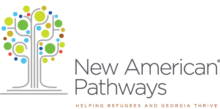Awet Woldegebriel was eight years old when the war came.
As a youth of Eritrean heritage born and living in Ethiopia, the Ethiopia-Eritrea War targeted his family especially hard. He and his family were cast out of the country they knew, sent back over the border that now stood as a battle line. Eventually, Awet and his sisters made it to America as refugees, where his father had already established himself.
Education was always important to Awet and his family. Awet came to Georgia knowing only the “ABC Song.” He had no other understanding of the English language – but when he joined the regular third-grade class at his school, he was determined to catch up. Awet credits this both to his father, who always taught him the importance of education and dedication, and to the experiences he had lived through. Awet had come to the U.S. more mature than his age, and was determined to make those back home proud – especially those who didn’t have the opportunity he did.
Awet started small. His librarian, who he still touts as a mentor, gave him a Dr. Seuss book and encouraged him that it was just fine to read a book like this at his age. Awet soon read everything Dr. Seuss ever wrote.
Awet continued his success and became a leader in high school. While working at a local Chick-fil-a, he had a chance encounter with Lawrence Schall, President of Oglethorpe University, who encouraged Awet to apply to his school. Awet did just that and soon became class president, for three years running.
Internships followed. Awet held an internship every semester starting freshman year. He was invited to speak at the Clinton Global Initiative, where he heard Muhtar Kent, CEO of Coca-Cola, espouse Awet’s own view: “Success comes by doing good.”
From then on, Awet knew he wanted to work for Coca-Cola. He began an internship there and was quickly offered a job. This March marks his second year with the company where he is the coordinator of the Learning and Development Team, overseeing the very internships he experienced.
Awet’s dedication to education has not floundered. He still believes that much of the world’s suffering can be connected to a lack of education. “True freedom is when you feel like you are empowered and empowerment happens when you have education,” Awet says. “Until I first opened my Dr. Seuss book, I had the weight of the war on me, and of anger.”
To keep other children from having this weight on them, Awet started his own non-profit called Knowledge Aid. Knowledge Aid offers scholarships to local refugees, so they too can know that someone is there, pushing them to achieve their educational goals. The organization also sends books to children in African countries like Kenya and Eritrea, so every child has the chance to find their “Dr. Seuss moment.”
Awet’s advice to all new Americans, whether you’ve just arrived or you have three generations living here is to share your story far and wide. Share it with your neighbors, your school mates, and with Georgia’s public and elected officials. Awet feels that, when he was a new American, sharing his story helped the people around him to see that he was the type of person who was going to succeed – and that any refugee who has made it here, can and will do just that. “I want people to understand I already fought a big battle. There’s nothing that is a limit to me; the limit was to try to get here,” Awet says. “I’m always going to be a survivor and I’m going to keep working hard, and doors open when that happens.”
Last year, Awet was featured in a widely read Atlanta Journal-Constitution article that told part of his incredible story. Since then, he’s only seen more success, becoming the youngest member ever of Buckhead’s Rotary Club and was recently named one of the Atlanta Business Chronicle’s 30 Under 30 Rising Stars in Atlanta.
